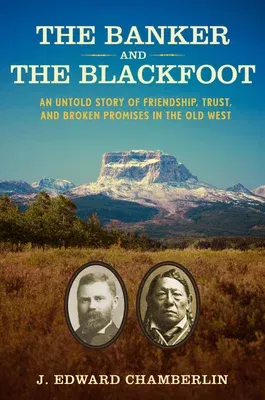During the last decades of the nineteenth century in the Old West,
cowboys and Indians, lawmen and outlaws, ranchers and farmers shared the
border between Canada and the United States--and mostly ignored it.
American traders and cowboys with their cattle came north to the
territory that later became Alberta, and the Blackfoot traveled south to
Montana to visit their kinfolk there. Bull trains regularly carried
supplies from Fort Benton, on the Missouri River, across the border to
Fort Macleod, a small ramshackle town in the foothills of the Rockies.
The Banker and the Blackfoot conjures up vividly the never-before-told
story of Fort Macleod, the surrounding Blackfoot territory, and the
foothills during roughly two decades, 1885 to 1905, when the people
living there--First Nations and Métis, rancher and farmer--respectfully
set out to accommodate Blackfoot sovereignty and new settlement--before
the Canadian government broke its Treaty promises to the Indians. There
were many friendships in this time and place, both among town residents
and foothills settlers and the police, and between many of them and the
Blackfoot. It was here that the self-made banker John Cowdry--J. Edward
Chamberlin's grandfather--met Crop Eared Wolf, the legendary Blackfoot
warrior and brilliant horseman, and their friendship and trust formed a
lasting bond. Cowdry later became the town's first mayor, and Crop Eared
Wolf succeeded his father, the great statesman Red Crow, as head chief
of the Blood tribe.
Fort Macleod embraced it all--Sun Dances and social dances, bibles and
medicine bundles, drums and piano recitals, horse races and polo
matches, and rodeos to celebrate both the horse culture of the Blackfoot
and the skills of the cattle range. The town was full of great
characters, including Madame Kanouse (Natawista), admired for both her
influential intelligence and her stunning fashion sense; Kamoose Taylor,
hospitable patron of the Macleod Hotel--where Francis Dickens, son of
the great novelist Charles Dickens, and the Sundance Kid himself were
found at the bar; Colonel James Macleod, commander of the North-West
Mounted Police; the taciturn Jerry Potts, unequaled Métis guide and
interpreter; John Ware, a successful black cowboy and rancher; and the
renowned Peigan chief Big Swan.
Full of wisdom, passion, and insight, The Banker and the Blackfoot
compellingly portrays a time when many people in that part of the Old
West looked for ways of getting along with each other and getting on
with the things that mattered to them all. Their remarkable story offers
hope for all of us today.

